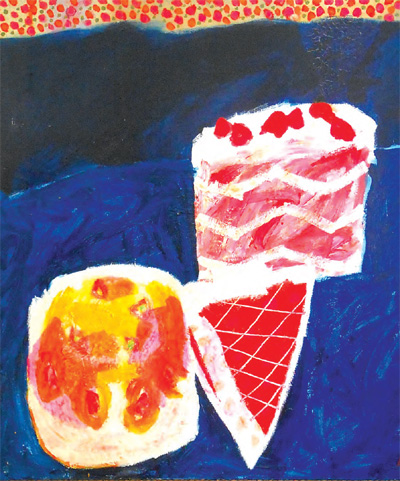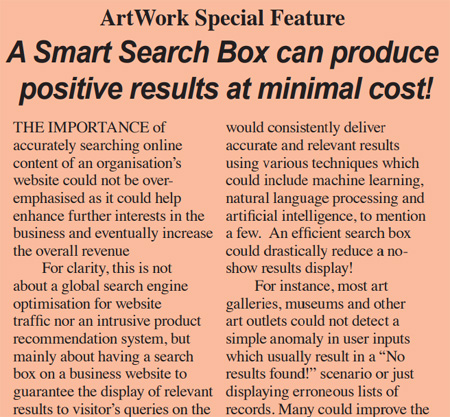
Borderline cases:
Nick Jones takes the cultural temperature in a not-too-rapidly-changing Berwick-upon-Tweed

The Flying Scotsman Crossing the Royal Border Bridge May 29, 1908 Alfred Hind Robinson @ The Maltings, Granary Gallery
BACK IN MAYA Berwick-upon-Tweed was named the happiest place to live by the Guardian. I'm with some visitors, who'd hoped to see a show at the Maltings arts centre. Shut, it's being demolished, ahead of a £ 25M+ redevelopment. The design has divided the town. On my headphones, Peter Sellers' skit, "We Need The Money".
The strap-cash-strapped Earl of Prong, challenged to keep his family and their ancestral seat, Bedside Manor, in the money, has hit on the idea of giving visitors the opportunity to pay to spend all day drinking tea and watching a building being built, demolished, built, demolished...ad infinitum.
Plans for the new Maltings have the green light, but not everyone's happy, particularly Berwick Heritage, an independent group committed to preserving the town's historic heritage. They describe them as "'unsympathetic, bland, soulless, utterly devastating"', and worse.
Meanwhile Create Berwick, tasked with kick-starting cultural regeneration, wants the town to become "'one of the most distinctive, must-see cultural destinations in the country, investing in arts, creativity and culture."' Get it right, think Sydney Opera House or Guggenheim Bilbao, and distinctions between art, sculpture and architecture dissolve, attracting tourists and cash in bucketfuls.
It's not clear how long the Maltings rebuild will take, or the final cost. Maybe, whilst we're waiting, there's a Bedside Manor style performance art opportunity here, complete with happenings, installations, and pop-ups. Or take a leaf out of the Edinburgh Fringe book and develop temporary spaces.
All summer, visitors have flocked in, full of expectation of cultural and historic delights ahead, blissfully unaware that when a storm blew through last winter it wasn't just the slates of W H Smith that slid onto Marygate, or the beautiful glass dome over Slightly Foxed bookshop in Bridge Street that was shattered (now, thankfully, restored).
This storm heralded more fundamental changes. The Barracks houses Berwick Museum & Art Gallery and the KOSB Regimental Museum; both closed for redevelopment. More frustrated visitors ask what's going on. I speak of jam tomorrow, a future promising improved exhibition, gallery, and archives, along with studios for artists and makers. All good reasons to return in years to come!
Elsewhere, private enterprise, sensing opportunity, has stepped into the breach. Culture-vultures won't be disappointed. W H Smith may have gone, but The Book Loft has opened nearby, selling new books. Another newcomer, Bastion Books, in Church Street, specialises in second hand military, adventure and expedition books. Turn down West Street and you'll find Abstract, a new art gallery showing a wide range of contemporary work by artists and makers.
Performance art is also alive and kicking, thanks to Tortive Theatre's small, informal space, Straw Yard, nestling inside the town's walls near the Barracks. And film? Maltings Cinema is temporarily relocated at the Mob Store. Hard to find, but comfortable once you get there. Meanwhile another string to Maltings' bow, Granary Gallery, remains unchanged. The Light of Days Past: Photography in Berwick 1840-1980 includes portraits, townscapes, and news stories, cataloguing changes in fashion, style, and technological advances over nearly two centuries. My favourites? Extended landscape format prints of Berwick Old Bridge and the Royal Border Bridge from 1908, including one of The Flying Scotsman.
Although easier to ask the question, "'where does recording end and artistry begin?"' than to answer it, I'd recommend heading for Foldyard Gallery in Bridge Street on leaving the Granary, to see Dave Watson's photography, influenced by Fay Godwin, John Blakemore, and Raymond Moore; all masters of traditional, pre-digital camera-work. Dave has set up his own darkroom, relearning old skills, and teaching them. Also at Foldyard, in complete contrast, Morag Eaton's prints, inspired by Carl Jung's "'Symbols of Transformation"', bridges between the conscious and unconscious mind.
Good news too, across the Old Bridge in Tweedmouth, just up from Dockside Gallery. Here Berwick Community Trust is well on with plans to convert the Old Brewery into eight artist spaces, a teaching/skill sharing space, community resource and a gallery. It's scheduled to open in 2026, with a relatively modest price tag of around £ 1M. I don't have the stats, but my experience with Berwick Creative Guild, set up in 2019 to bring artists and creatives together to share work, resources and projects, was that this town buzzed with creativity. It still does. The new Brewery will surely take it up a gear, providing that the ensuing regeneration doesn't price the creative young out of the housing market.
Beware geese laying golden eggs!
www.berwick-heritage.co.uk/maltingswww.createberwick.co.uk
www.maltingsberwick.co.uk/whats-on/the-light-of-days-past-photography-in-berwick-1840-1980
www.english-heritage.org.uk/visit/places/berwick-upon-tweed-barracks-and-main-guard/new-vision-for-berwick-barracks/






